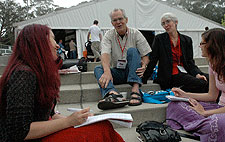Apr
11
2009
In the New Testament and in the early church, preaching (heralding) was something done to outsiders, persuading them to repent and believe the gospel.

“…we face a situation today in most evangelical and Reformed churches in which the reading and preaching of Scripture is the only way in which the Word is made manifest in the lives of the saints. This is a real loss for the people of God. The result is the primacy of the preacher. The preacher not only does the only really important thing in the service (preach), he also composes (if he even does that) the prayers that are prayed, and he prays them by himself. It boils down very often to worship by proxy, exactly what the Reformation fought against. Only in the Lutheran and Episcopal churches is there more than a minimum of congregational participation, because of the use of prayer books.
Since all that is left is preaching, the act of preaching takes on dimensions foreign to the Bible. Continue reading
3 comments | tags: Communion, Ecclesiology, James Jordan, Preaching, Reformation, Worship | posted in Christian Life
Apr
11
2009

Living in the beautiful Blue Mountains, for exercise, I walk a lot. Keeping a diary last year, I just calculated that I walked over 900 kms.
Walking is when I do my best listening and thinking. Thank God for an iPod, an mp3 Bible and James Jordan lectures. His series on Revelation took me a year in 2007.
900kms (or 204 lectures) might seem a lot to get through, but you know what they say about eating an elephant.
All Jordan’s lectures are available in one package here. I must say, they also have a very attractive cover.
Comments Off | tags: James Jordan, Revelation, Wordmp3 | posted in Biblical Theology
Apr
11
2009
A worship service should follow the seven-fold Covenant pattern:
Call to Worship (Genesis – Sabbath)
…..Confession of Sin (Exodus – Passover)
……….Ascension of Praise (Leviticus – Firstfruits)
……………Teaching the Word (Numbers – Pentecost)
……….Offertory (Deuteronomy – Trumpets)
…..Communion (Joshua – Atonement)
Thanksgiving & Dismissal (Judges – Booths)

This pattern also structures the Creation week (Genesis 1), the Tabernacle speeches (Exodus 25-31) and the Ascension offering (Leviticus 1).
What is interesting is that the Firmament is Day 2 (Red Sea – death), but the Tabernacle puts it at Day 6 because Adam needs resurrection (Jordan).
So, in our services, at confession of sin, the saints are in the Laver. At Communion, the Laver is in the saints. We in Him and He in us.
Comments Off | tags: Feasts, Tabernacle, Worship | posted in Biblical Theology, Christian Life
Apr
11
2009
by Halden at inhabitatio dei
“One of the elements of theological discipline that has been lacking for a long time among theologians has been the consistent practice of doing commentary on Scripture.
Continue reading
Comments Off | tags: Commentary, Halden Doerge | posted in Christian Life, Quotes
Apr
11
2009
Chuck Lawless, Jr. writes:
I recently read a book by a mainline pastor who longs for the churches of his denomination to grow again. Comparing those churches to growing churches, he hinted throughout the book at what he could not bring himself to say forthrightly: growing churches are usually characterized by conservative theology…
 Thom Rainer’s works… have shown that churches that grow by reaching non-believers have a theology that is best described as conservative and orthodox. The bottom line is this: theology really does matter if we want to grow biblical, healthy churches.
Thom Rainer’s works… have shown that churches that grow by reaching non-believers have a theology that is best described as conservative and orthodox. The bottom line is this: theology really does matter if we want to grow biblical, healthy churches.
We conservatives know this truth, and we are quick to remind others of this fact. What we are not so quick to acknowledge is the focus of this blog: we do a poor job of teaching the very theology that we claim is so important.
We think that our church members understand and believe our basic doctrine, even while those same members are learning their theology from TV talk show hosts, popular television preachers, or the latest religious novel.
Do an anonymous survey of your congregation’s beliefs, and see what you learn. If the majority knows and believes basic biblical doctrine, your church is more an exception than the norm.
Read more for practical tips on teaching theology.
Comments Off | tags: Church Growth, Preaching | posted in Biblical Theology, Christian Life
Apr
11
2009
 The heir to a hero of Chinese mission says the Christian press’ obsession with persecution in China is “misdirecting the mission world” away from effective gospel ministry in that nation.
The heir to a hero of Chinese mission says the Christian press’ obsession with persecution in China is “misdirecting the mission world” away from effective gospel ministry in that nation.
China bashing distorts mission by Jeremy Halcrow
Comments Off | tags: China, Mission | posted in Christian Life, Ethics
Apr
11
2009
I think this was a line from the movie Bug’s Life, when a moth responds to calls from other bugs to stay away from the flame (or lightbulb).
A friend recently told me that moths use the moon to navigate. They continue in a straight line by keeping it on one side, which is why smaller lights get them flying in circles.
I thought this was a great analogy for the way idolatry gets us spinning our wheels.
Comments Off | tags: Typology | posted in Christian Life, Creation
Apr
11
2009
Or, Reading the Bible without imposing your own worldview.
It seems we either read the Bible carefully but with the blinkers of remnant higher criticism (modernism), or we ‘get’ the narrative and typology but disregard the basic boundaries of responsible interpretation (postmodernism). Rich Lusk writes:
Biblical Theology requires us to learn to read the biblical narrative from within. We are insiders to the story of Scripture. It’s our story. We have to learn to read the Bible canonically. We have to allow the Word to absorb the world rather than allowing the world to absorb the Word. We have to take Scripture’s outlook as normative rather than imposing another worldview on our reading of Scripture. We must learn to read the Bible organically, in terms of itself. We should read the Bible the same way Peter, Susan, Lucy, and Edmond would read The Chronicles of Narnia: as a story not only for us, but about us.
Reading the Bible organically means reading it intertextually and typologically. Intertextual reading listens for echoes of and allusions to other passages within the canon, using Scripture to interpret Scripture. Typological reading looks for repeating patterns within the unfolding storyline of Scripture. Biblical typology is focused on totus Christus — the whole Christ, head and body, Jesus and the church. Typology means reading the Bible on its own terms, as a revelation of the suffering and glory of Christ (Lk. 24). As we move from type(s) to antitype, there is both correspondence and escalation.
Read his full article here.
Comments Off | tags: Biblical worldview, Hermeneutics, Higher Criticism, Modernism, Rich Lusk, Totus Christus, Typology | posted in Biblical Theology
Apr
11
2009
 We don’t know how many wise men travelled from the east, but perhaps we can make a guess via God’s deliberate typology.
We don’t know how many wise men travelled from the east, but perhaps we can make a guess via God’s deliberate typology.
You must be logged in to see the rest of this post.
Join now for a year for $15!
1 comment | tags: Babylon, Christmas, Incense Altar, Lampstand, Table of Showbread, Typology | posted in Biblical Theology
Apr
11
2009
Interpretive Maximalism

Need help combating those pesky liberal scholars who insist the Bible has been cobbled together and is nothing but an archaic shambles? Or those premillennialists who gasp in horror when you mention that the church replaced Israel? You need a strong dose of interpretive maximalism. It cuts liberal scholarship and dispensational nonsense to shreds. How? It shows, using repeated typology, that orthodox preterism and postmillennialism flow naturally out of the Old Testament.
Continue reading
Comments Off | tags: Dispensationalism, James Jordan, Postmillennialism, Preterism, Replacement Theology | posted in Biblical Theology
































